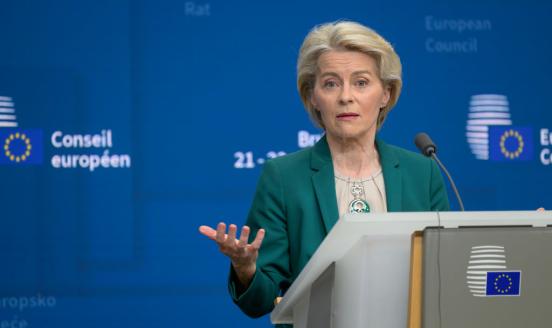Interview with Jean-Claude Trichet
Jean-Claude Trichet gave an interview about his appointment as chairman of Bruegel Board.

BR: Mr. Trichet, what have you been doing since you left the ECB?
JCT: I have been reflecting a lot, traveling, lecturing...and I have just been appointed chairman of the Bruegel board.
BR: When did you get to know Bruegel?
JCT: I know Bruegel from the very beginning. The think tank has a very impressive record and a very flattering ranking amongst the best think tanks. In my view, it is one of the very best in the world in its field.
BR: What are your priorities for your new job at Bruegel?
JCT: I am the Chairman namely the leader of the team. It is the team of directors, namely the Board that decides. Let me just say that I am honoured to step up as Bruegel Chairman and to succeed such remarkable chairmen as Leszek Balcerowicz and Mario Monti. I am looking forward to start working with Bruegel members to help shaping European economic policy.
BR: When you were still at the helm of the ECB, did you read Bruegel reports?
JCT: Of course I did. I did read Bruegel papers, like a number of academic reports. We are living in a period where we have to understand better what has happened. Since the beginning of the global financial crisis in 2007, conventional analysis has proved limited. The crisis has not been predicted, which leads me to the conclusion that we need to do much more research particularly in the domain of systemic instability.
BR: Could you please explain what kind of research we need?
JCT: The main issue is the fragility of the financial system. How comes that the financial system is so fragile that a crisis can affect all major advanced economies? We also need to better understand systemic risks. The international community is working actively through the G20, the Financial Stability Board and the Basel Committee in particular. The European systemic risk board is concentrating on potential systemic instability. Where does the instability come from? This is an important question, we are living in very challenging and intellectually dynamic times - and in order to understand, we need more research.
BR: Do you think that more and better research could have helped to prevent the crisis?
JCT: The financial crisis was very difficult to foresee. It was a new phenomenon, it unfolded so rapidly. So we could not necessarily have prevented it. But now that we have experienced the crisis, there is no excuse not to do all the research what we can to understand fully what has happened in order to prevent events of that kind in the future.
BR: You are talking about the financial crisis in general. How about the sovereign debt crisis in Europe?
JCT: I think that we are experiencing the first global crisis of the advanced economies since World War II. The first episode from August 2007 up to the bankruptcy of Lehman Brothers (mid September 2008) was an episode of financial turbulences. Then we had a dramatic intensification of the financial crisis from the crash of Lehman to the end of 2009: it was the second episode with the threat of the collapse of the global financial system and the great recession. In the two first episodes the epicenter of the crisis was in the US. Then we had the third episode: the crisis of the sovereign signatures. It is still a global crisis of the advanced economies but, this time the epicenter of the crisis is in Europe.
BR: But this time, it looks really dangerous for Europe?
Yes, but the crisis was threatening right from the start. In the beginning, there was a risk of a great depression like in the 30s of the last century. This said, as the epicenter of the present episode of the crisis, Europe has a great responsibility right now. We need an much improved governance in the Euro Zone, this is absolutely decisive.
BR: Let us talk about Germany. Given your experience, what would you recommend to German decision makers in the current crisis?
JCT: Germany is in a very special position. It is a little bit in a situation as Sweden and Canada. Both countries encountered dramatic crises in the 80s and 90s. They made important reforms and worked a lot in order to improve their economies. The reward has been a remarkable resilience in the present crisis. Germany also had major problems after reunification. During the last 13 years Germany worked a lot on its economy, it regained competitiveness, and proved remarkably resilient in this new global crisis - just like Canada and Sweden did. It is clear now that the European countries, particularly the Euro Area countries have to improve decisively their economic and budgetary governance. It calls for resolute individual countries adjustments as well as for appropriate collegial monitoring, follow-up and, when necessary and justified, support. We are all interdependent.
BR: Thank you very much, Mr. Trichet.
(The questions were put by Eric Bonse at Bruegel)



